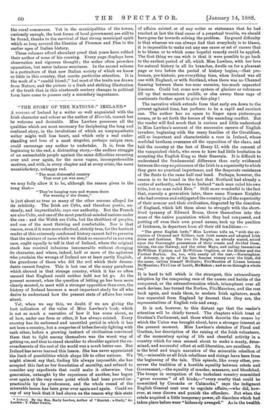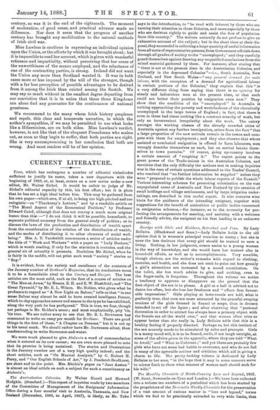"THE STORY OF THE NATIONS :" IRELAND.*
A HISTORY of Ireland by a writer so well acquainted with the Irish character and colour as the author of Huffish, cannot but be welcome and desirable. Miss Lawless possesses all the qualities which are most necessary for deciphering the long and confused story, in the involutions of which an unsympathetic writer might well lose heart, and which only a real under- standing and love of a most singular, perhaps unique race, could encourage any author to undertake. It is, from the beginning to the end, a distracting story,—the endless struggle of an nnteachable people against the same difficulties recurring over and over again, for the same vague, incomprehensible motives, and with, in every chapter and at every crisis, the same unsatisfactory, unhappy end.
"The most distressful country That ever yet was seen,"
we may fully allow it to be, although the reason given in the
song that-
" They're hanging men and women there For wearing o' the Green,"
is just about as true as many of the other reasons alleged for its infelicity. The Irish are Celts, and therefore poetic, un- steady, and impracticable, says one authority. But the French are also Celts, and one of the most practical-minded nations under the sun : and the Welsh are Celts, but the thriftiest of peoples, and one of the most thriving and comfortable. Nor is that reason, even if it were more effectual, strictly true, for the hastiest reader of this extremely condensed history cannot fail to perceive that the mixture of races which we think so successful in our own case, ought equally to tell in that of Ireland, where the original stock has received infusions innumerable without changing its character, and where, indeed, half or more of the agitators who proclaim the wrongs of Ireland are at least partly English, the grandsons of those who did the evil which their descen- dants cannot forgive. This is but one of the many paradoxes which abound in that strange country, which it has so often seemed that England could neither hold nor let go. At the present moment, when the question of letting go has been more clearly mooted, to meet with a stronger opposition than ever, the history of Ireland becomes a most important study for all who 'desire to understand how the present state of affairs has come about.
Yet, when we say this, we doubt if we are giving the best indication of the value of Miss Lawless's book, which is not so much a narrative of how it has come about, as of how, under one form or other, it has always existed. Every -country has its unformed and unsettled period in which it has not been a country, but a congeries of tribes fiercely fighting with -each other, before a growing instinct of civilisation convinced them that to fight among themselves was the worst way of getting on, and that to stand shoulder to shoulder against the en. -croachments of the rest of the world was a much better one. Bat Ireland has never learned this lesson. She has never appreciated the limit of possibilities which shape life to other nations. We might almost say that, finding life always impossible, she has accepted this fact as her foundation of morality, and refused to -consider any expedients that could make it otherwise. One generation, untaught by the experience of another, has begun -over again at the very same point which had been proved im- practicable by its predecessor, and the whole round of the miserable lesson has been gone over again and again. Could we -say of any book that it had shown us the reason why this state
* Ireland. By the Hon. Emily Lawless, Author of " Etwrish : a Study," &c. London : T. Maher Unwin.
of affairs existed, or of any writer or statesman that he had , reached at last the final cause of a perpetual trouble, we should have gone far towards solving the problem. Its grand difficulty is that whereas we can always find that everybody is to blame, it is impossible to make out any one cause or set of causes that is to blame, or to which some hopeful remedy could be applied. The first thing we can wish is that it were possible to go back to the earliest period of all, which Miss Lawless, with her love for natural history in all its branches, dwells on for a pleasant page or two before the period of history begins,—that pre- human, pre-historic, pre-everything time, when Ireland was all one with England, or with Scotland, when there was no Channel foaming between these too-near enemies, too-much separated kinsmen. Could but some new system of glaciers or volcanoes fill up that momentous puddle, or else sweep these rags of continents further apart to give fair-play !
The narrative which extends from that early era down to the present agitated time, has perforce to be a rapid and succinct one. The author has no space to linger upon picturesque scenes, or to set forth the heroes of the unending conflict. But the reader will find much that is curious and little understood in Miss Lawless's account of the successive careers of English invaders, beginning with the many families of the Geraldines, still so important and characteristic a race in Ireland, whose mailclad brethren overcame all the opposition of the clans, and laid the country at the feet of Henry II. with the consent of the vanquished chiefs, who seem to have had little hesitation in accepting the English King as their Suzerain. It is difficult to understand the fundamental difference thus early evidenced between the easy acquiescence of the Irish in a superiority to which they gave no practical importance, and the desperate resistance of the Scots to the same half-real bond. Perhaps, however, the reason is to be found in the fact that Scotland had already a centre of authority, whereas in Ireland "each man ruled his own tribe, but no man ruled Erin." Still more wonderful is the fact that, scarcely a generation later, these same Norman Knights who had overrun and subjugated the country in all the superiority of their armour and their civilisation, disgusted by the desertion of England, which left them alone to struggle with the short- lived tyranny of Edward Bruce, threw themselves into the mass of the native population which they had conquered, and putting off even their own proud names, took up the position of Irishmen, in departure from all their old traditions :—
"The great English lords," Miss Lawless tells us, "with the ex- ception of Ormond and Kildare, took Irish names and adopted Irish dress and fashions. The two De Burghs, as already stated, seized upon the Connaught possessions of their cousin and divided them, taking, the one Galway, and the other Mayo, and calling themselves McWilliam Eighton and McWillia,n Onghton, or the Hither and the Further Burke& So, too, with nearly all the rest,—Bermingham of Athenry, in spite of his late famous victory over the Irish, did the same, calling himself McGoris ; FitzManric,e of Lixnau became McMaurioe ; FitzUrse of Loath, McMahon ; and so on through a whole list."
It is hard to tell which is the strangest, this extraordinary adoption by the conquering race of the names and habits of the conquered, or the retransformation which, triumphant over all such devices, has turned the Burkes, FitzMaurices, and the rest back again, and made them, to modern Irish agitators, much less separated from England by descent than they are, the representatives of English rule and sway.
It is not, however, to this distant age that the reader's attention will be chiefly turned. The chapters which treat of Grattan's Parliament, and those which describe the means by which the Union was brought about, have a stronger interest at the present moment. Miss Lawless's sketches of Flood and Grattan, her description of the raising of the Irish volunteers, of the momentary spring of life and cheerful activity in a country which for once seemed about to make a manly, deter- mined, and successful effort at self-liberation, are excellent. E.o is the brief and tragic narrative of the miserable rebellion of '98,—miserable as all Irish rebellions and risings have been from the beginning of the tale. This episode, like every other, pre- serves the tradition of a horrible equality between rebels and Government,—the equality of murder, massacre, and bloodshed. The troops in occupation of the turbulent country committed "gross excesses" of all kinds,—" every cruelty that could be committed by Cossacks or Calmucks," says the indignant English General sent over to regulate affairs,—who did, how- ever, at once disown and punish the offenders. But when the rebels acquired a little temporary power, all disorders which had taken place before were "hideously avenged." As in the twelfth
century, so was it in the end of the eighteenth. The moment of moderation, of good sense, and practical advance made no difference. Nor does it seem that the progress of another century has brought any modification to the natural methods of Irish civil war.
Miss Lawless is cautions in expressing an individual opinion upon the Union, or the efforts by which it was brought about; but it is impossible to read her account, which is given with wonderful reticence and impartiality, without perceiving that her sense of the unworthiness of the means employed, and the reluctance of one of the contracting parties, is strong. Ireland did not want the Union any more than Scotland wanted it. It was in both cases more or less imposed by the will of the stronger, though with a far less perception of possible advantages to be derived from it among the Irish than existed among the Scotch. We may say so much without in the smallest degree departing from our conviction that it is in union that these three Kingdoms can alone find any guarantee for the continuance of national greatness.
We recommend to the many whom Irish history perplexes and repels, this clear and temperate narrative, in which the author's sympathies, if we may be permitted to use what looks like a Hibernicism, are on both sides. Miss Lawless's verdict, however, is not like that of the eloquent Frenchman who makes out, as soon as they begin to suffer, that both parties are right. She is very uncompromising in her conclusion that both are wrong. And most readers will be of her opinion.







































 Previous page
Previous page